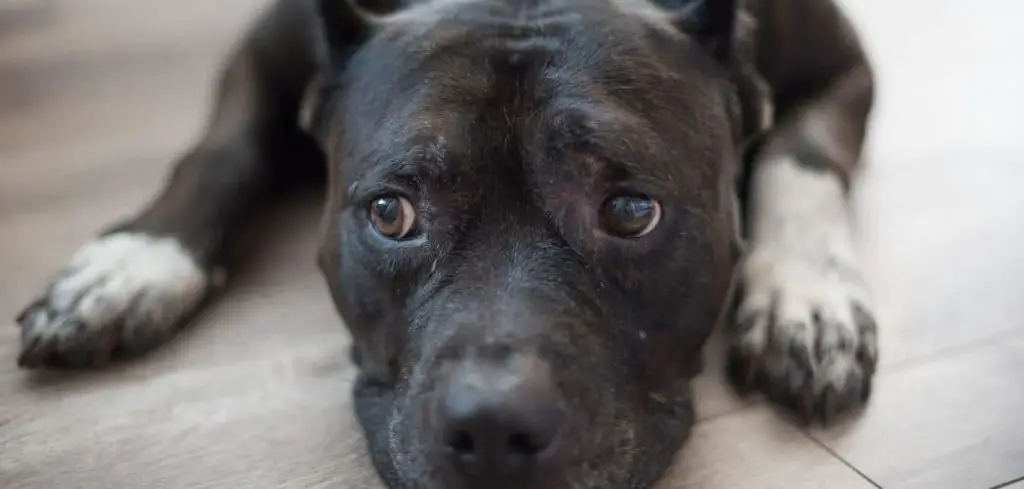If your dog has eye discharge and isn’t eating—and is also unusually lethargic—it’s a red flag that shouldn’t be ignored.
While each of these symptoms can occur on their own for minor reasons, when they appear together, they often point to an underlying condition.
Your dog’s eyes offer important clues, and when changes in energy and appetite accompany those signs, it’s time to take a closer look.
We outline what causes your dog to have eye discharge, loss of appetite, and lethargy, what you can do at home, and when to call your vet.
Dog Eye Discharge and Not Eating and Lethargic: Why It Happens
A dog showing eye discharge and not eating and lethargic may be suffering from a viral or bacterial infection, systemic inflammation, tick-borne disease, eye trauma, fever, or a chronic condition like kidney or liver dysfunction.
These symptoms together suggest that your dog’s body is under stress, fighting off illness, or in pain—and not just dealing with an eye problem.

Dog Eye Discharge and Not Eating and Lethargic: Common Causes
1. Canine Distemper
Canine distemper is a highly contagious viral disease that often begins with eye discharge and quickly progresses to include lethargy, loss of appetite, nasal discharge, coughing, and fever.
In some cases, neurological symptoms like twitching or seizures may appear later. Puppies and unvaccinated dogs are most at risk.
If your dog shows multiple signs of illness alongside thick, goopy eye discharge, distemper is a serious possibility.
2. Respiratory Infection
Bacterial or viral respiratory infections—such as kennel cough or canine influenza—can cause green or yellow eye discharge, nasal congestion, coughing, and fatigue.
Dogs with respiratory infections may not eat well due to congestion, throat pain, or fever.
Eye symptoms usually develop early, followed by systemic symptoms like sleeping more and losing interest in food.
Related: Dog vomiting and not eating (Causes and when to worry)
3. Tick-Borne Disease
Tick-borne illnesses can present subtly at first but often progress to include fever, eye inflammation, muscle pain, lethargy, and appetite loss.
Dogs may seem stiff or withdrawn and show discharge from the eyes due to immune system activity or secondary infections.
If your dog spends time outdoors or in tick-infested areas and is showing these signs, blood testing is recommended.
4. Eye Injury or Ulcer
A scratched cornea, foreign object, or trauma near the eye can lead to discharge, pain, and behavior changes.
If your dog is keeping an eye shut, avoiding light, or rubbing at the face, there may be an injury or ulcer.
Pain and stress can cause lethargy and refusal to eat. In severe cases, untreated eye trauma can result in vision loss or systemic infection.
Related: Dog eye discharge and not eating (Causes and what to do)
5. High Fever or Dehydration
A fever can cause your dog to act listless and uninterested in food. Infections—whether localized to the eye or more widespread—often lead to elevated body temperature and fatigue.
Eye discharge may appear as part of an immune response.
Dehydration, often caused by illness or vomiting/diarrhea, can also result in sunken eyes, thick discharge, and overall weakness.
6. Kidney or Liver Disease
Chronic illnesses affecting the kidneys or liver can present with vague symptoms, including eye irritation, fatigue, and food refusal.
As toxins accumulate in the body, the eyes may show signs of inflammation or secondary infection, and your dog may feel too nauseated or weak to eat.
These signs can be early indicators of systemic organ decline, especially in older dogs.
7. Canine Uveitis or Glaucoma
Both conditions involve inflammation and pressure in the eye and can be extremely painful.
If your dog’s eye appears cloudy, red, or bulging with significant discharge, and they are acting lethargic or skipping meals, it could be a serious ocular emergency.
These conditions require prompt treatment to prevent vision loss and reduce discomfort.
What to Do If Your Dog Has Eye Discharge, Isn’t Eating, and Is Lethargic
If your dog has all three of these symptoms at once, you should monitor them closely but assume the situation may escalate quickly.
Here’s what to do in the short term:
Gently clean the eye area with warm saline or a damp cloth to remove discharge.
Offer small amounts of soft, bland food (like boiled chicken and rice) to see if your dog will eat.
Encourage hydration by offering ice cubes or flavoring water with a little low-sodium broth.
Keep your dog in a quiet, comfortable environment, away from noise or bright lights.
Use an e-collar if your dog is pawing or scratching at the eyes.
Avoid using over-the-counter eye drops without veterinary approval—they can worsen some conditions.
If there’s no improvement within 12–24 hours, or your dog gets worse, seek veterinary help immediately.
When to Call or Visit Your Vet
You should call your vet or go to the clinic if:
Your dog’s eye discharge is thick, green, bloody, or has a foul smell.
They refuse food for more than one day.
They are excessively tired, confused, or collapsing.
Vomiting, diarrhea, or fever accompanies the other symptoms.
One or both eyes are swollen, bulging, or appear injured.
Your dog is very young, senior, or has a pre-existing medical condition.
You suspect exposure to ticks, toxins, or contagious dogs.
Your vet may perform an eye exam, blood tests, or imaging to pinpoint the cause.
Treatment may involve antibiotics, IV fluids, anti-inflammatory medications, or hospitalization in more severe cases.
Related: Dog Eye Discharge and Not Eating and Vomiting
Key Takeaway
When your dog is experiencing eye discharge, isn’t eating, and is lethargic, it’s usually more than a minor issue.
These combined signs often indicate your dog is in pain, fighting an infection, or dealing with systemic illness.
Don’t wait and hope it clears up—dogs can decline rapidly when they stop eating or drinking and show signs of illness.
Trust your instincts, and act promptly. Early diagnosis and treatment can help your dog recover faster, prevent complications, and ease their discomfort.
